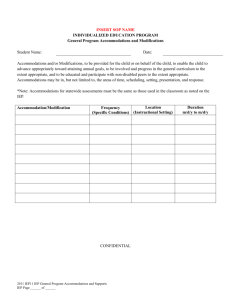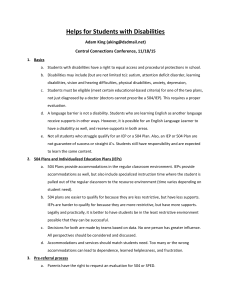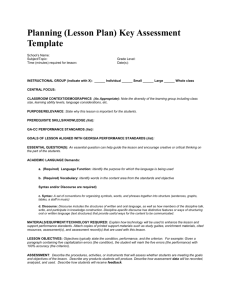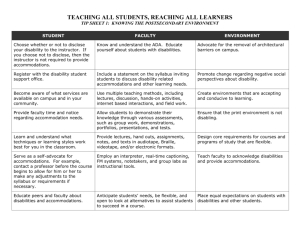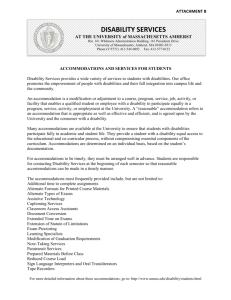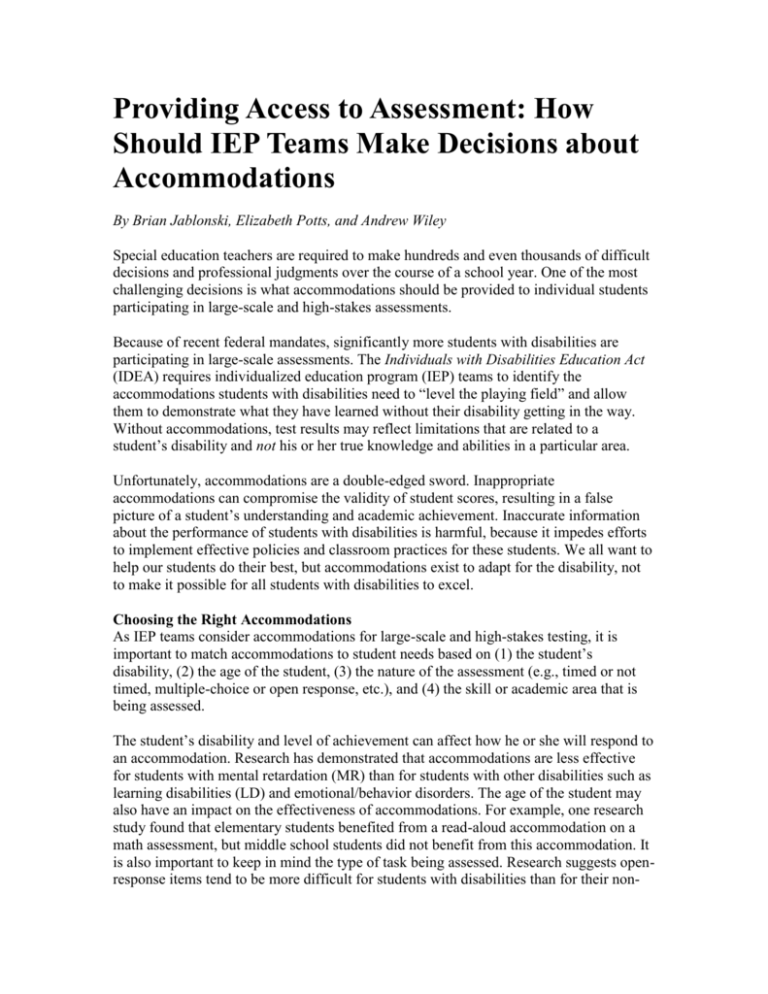
Providing Access to Assessment: How
Should IEP Teams Make Decisions about
Accommodations
By Brian Jablonski, Elizabeth Potts, and Andrew Wiley
Special education teachers are required to make hundreds and even thousands of difficult
decisions and professional judgments over the course of a school year. One of the most
challenging decisions is what accommodations should be provided to individual students
participating in large-scale and high-stakes assessments.
Because of recent federal mandates, significantly more students with disabilities are
participating in large-scale assessments. The Individuals with Disabilities Education Act
(IDEA) requires individualized education program (IEP) teams to identify the
accommodations students with disabilities need to “level the playing field” and allow
them to demonstrate what they have learned without their disability getting in the way.
Without accommodations, test results may reflect limitations that are related to a
student’s disability and not his or her true knowledge and abilities in a particular area.
Unfortunately, accommodations are a double-edged sword. Inappropriate
accommodations can compromise the validity of student scores, resulting in a false
picture of a student’s understanding and academic achievement. Inaccurate information
about the performance of students with disabilities is harmful, because it impedes efforts
to implement effective policies and classroom practices for these students. We all want to
help our students do their best, but accommodations exist to adapt for the disability, not
to make it possible for all students with disabilities to excel.
Choosing the Right Accommodations
As IEP teams consider accommodations for large-scale and high-stakes testing, it is
important to match accommodations to student needs based on (1) the student’s
disability, (2) the age of the student, (3) the nature of the assessment (e.g., timed or not
timed, multiple-choice or open response, etc.), and (4) the skill or academic area that is
being assessed.
The student’s disability and level of achievement can affect how he or she will respond to
an accommodation. Research has demonstrated that accommodations are less effective
for students with mental retardation (MR) than for students with other disabilities such as
learning disabilities (LD) and emotional/behavior disorders. The age of the student may
also have an impact on the effectiveness of accommodations. For example, one research
study found that elementary students benefited from a read-aloud accommodation on a
math assessment, but middle school students did not benefit from this accommodation. It
is also important to keep in mind the type of task being assessed. Research suggests openresponse items tend to be more difficult for students with disabilities than for their non-
disabled peers. Additionally, accommodations tend to be more helpful with openresponse items than with multiple-choice items.
The growing body of research provides us with some clues about how to best
accommodate students. As teachers and IEP teams consider which accommodations are
appropriate for each individual student, they may want to consider these findings.
Read-Aloud
When considering read-aloud accommodations, bear in mind the following:
Read-aloud accommodations are a legitimate accommodation on reading
comprehension assessments, but change the usefulness of results with assessments
that also measure decoding.
Read-aloud is helpful for test items with more text and alternatively less useful for
items with less text.
Read-aloud accommodations are useful on math problem-solving assessments for
many students with LD, but this accommodation may be detrimental for
assessments that focus on computations.
Students do better when they can set their own pace with a read-aloud
accommodation, as when they have a tape player they can pause.
Students with LD improve their performance from the standard math assessment
when provided simplified language.
Extra Time
When considering allowing a student extra time, take into account what the research says
about extra time on high-stakes assessments:
When allowed extra time, students with LD tend to benefit from using the time to
answer more questions. But when students with attention deficit hyperactivity
disorder (ADHD) are provided extra time, they still complete the assessment in
the standard time limit. Consider using a flexible schedule for students with
ADHD.
Extended time tends to be more beneficial for high-ability students than for lowability students.
Use of some accommodations such as large print and Braille may create a need
for extra time.
Other Accommodations
For students whose disability impedes their ability to write, IEP teams should consider
allowing them to dictate to a scribe or use a speech-to-text software program. Research
has shown that students with disabilities increase the quantity and quality of their writing
when dictating their responses, including when using speech-to-text software. Word
processing software may also be useful for some students’ written responses.
The use of calculators for mathematics tests is appropriate when assessing problemsolving ability but generally not appropriate when students are asked to demonstrate their
ability to perform computations.
The most commonly used accommodation on state-wide and other large-scale
assessments is small group or individual administration. There is little research to provide
guidance about the use of this accommodation, with one exception: Students do perform
better when taking an assessment with a familiar teacher.
Once the IEP team has chosen the appropriate accommodations, the student may need
instruction to fully utilize the accommodations. Some technology may require specific
training, and even the use of extra time may require a student to learn to budget that time
appropriately.
As teachers and IEP teams prepare students to take high-stakes assessments, they should
keep in mind what tasks the test will assess as well as how the student’s disability effects
his or her ability to demonstrate abilities on the test. The IEP team must also make sure
that these accommodations match the accommodations used by the student in the
classroom and on teacher-made assessments. With appropriate assessments, students with
disabilities can not only participate in high-stakes assessments, but also accurately
demonstrate their proficiency.
Brian Jablonski teaches for Lynchburg City Schools in Virginia; Elizabeth Potts is
Program Director for Special Education and Initial Licensure at the University of
Virginia, Falls Church campus; and Andrew Wiley is an assistant professor of
mild/moderate special education at Kent State University in Ohio.
CEC members are welcome to distribute information published in CEC Today for
educational purposes only. Please attribute this content to the Council for Exceptional
Children. All rights reserved.


